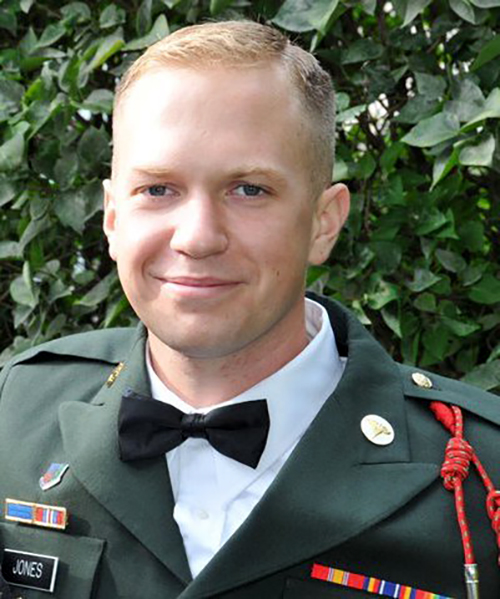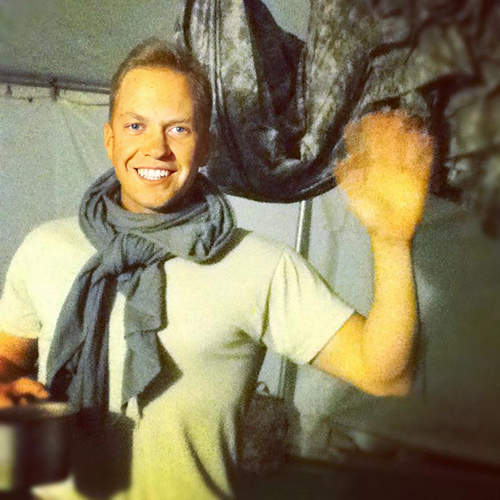Original article is posted on A&S News as well as pasted below. This story was also featured in the Bulletin Brief.
When Zak Jones was young, his mother encouraged him to carry around a notebook and write down any interesting thoughts or observations.
“I've kept that practice going throughout my adult life,” he says.
Capturing those thoughts has paid off. In fact, it’s led to two degrees at U of T with another one underway, a poetry collection, a book of short stories and most recently, several writing awards. Jones, a PhD candidate with the Faculty of Science’s Department of English, was awarded the 2023 RBC Bronwen Wallace Award for short fiction for his short story, “So Much More to Say.” The award celebrates emerging Canadian writers in the fields of poetry and short fiction.
Jones’ story is set in a flooding South Carolina cemetery and delves into the thoughts of a young gravedigger who has the gruesome task of reburying the bloated bodies that have risen to the surface after heavy rains.
-
Read the short story: “So Much More to Say.” [PDF]
Says the award’s selection committee: “Navigating race relations and human dignity, the impeccable drawl of the author’s first-person narrator turns potential horrors into profundities, and cautionary tales into wisdoms.”
“Winning this award was a vote of confidence,” says Jones. “I'm feeling much more secure in my self-conception as an artist. Now, when I tell people I'm a writer, I'm not half-joking.” Adding to his confidence, Jones was also just notified that he’s won the Norma Epstein Foundation Award in Creative Writing — part of the University College’s writing awards for another short story titled “Love Handles.”

Zak Jones in his “dressed greens” in 2010.
These are satisfying accomplishments, considering there was a time when an unfocused Jones wasn’t sure if he would finish high school.
His path to U of T was a little unconventional. He might be the only PhD student in the English department who has served in the U.S. military.
“My grandfather, my dad and all of his brothers were in the army,” says Jones. “It was one of those things that was on the table for my brother and I since we were little boys.”
The brothers enlisted together soon after they both finished high school. They trained together to become army medics, doing their basic training at Fort Jackson in South Carolina, followed by Fort Sam Houston near San Antonio, Texas, and then several bases around the United States.
In a strange twist the brothers were never sent overseas because they happened to be in the same unit as Chelsea Manning. She made international headlines in 2013 for violations of the U.S Espionage Act after sharing nearly 750,000 classified, or unclassified but sensitive, military and diplomatic documents on WikiLeaks.
Winning this award was a vote of confidence. I'm feeling much more secure in my self-conception as an artist. Now, when I tell people I'm a writer, I'm not half-joking.
“Thanks to Chelsea, my brother and I were spared a deployment,” says Jones.
While they trained, they also took college classes online and Jones earned the equivalent of an associate’s degree from Columbia College in Missouri. “From there, I learned how to write a paper and read for academic purposes,” he says.
Jones left the army and moved to Toronto in 2013 with hopes of attending U of T. But he didn’t get accepted on his first try. Determined to get in, he took part in Woodsworth College’s Academic Bridging Program, where he took a lone English course.
“I fell in love with English,” he says. “I fell in love with Robarts Library and the archives and just reading, so I ended up doing pretty well.” Well enough to be accepted to U of T as a full-time student.

Completing his undergraduate degree, he then set his sights on a masters in creative writing.
His thesis project for his master’s was Fancy Gap, a novel about a family separated by illness and addiction in southern Appalachia. Tackling issues such as religion, sexuality, amnesia and the region’s sociocultural failings, Fancy Gap follows two brothers and an estranged, self-radicalized, born-again grandmother who create turmoil in their mountainous regions of North Carolina and Virginia.
He’s currently putting the finishing touches on this book and connecting with potential publishers.
Outside of his studies, Jones also crafted a poetry collection, I Come Up From The Earth.
Written from 2009-2021, his poems cover subjects such as his ethical worries about serving in the army, the mental anguish surrounding his mother’s second bout with breast cancer, and the intense nostalgia experienced upon returning to his home in the South to visit her. For this work, Jones has been selected as a finalist for the Vallum Chapbook Poetry Prize.
Nothing was as attractive to me as U of T. I even got into Oxford, but decided I wanted to be here.
Also in the works is a short story collection called Mamas. “It's stories about maternal devotion, or the lack thereof, from various points of view, not just from the moms’ but there is a mom in every story, and I think it's quite pretty and sad,” says Jones.
When it came time to pick a PhD program a year ago, the choice was easy.
“Nothing was as attractive to me as U of T,” he says. “I even got into Oxford, but decided I wanted to be here.”
Jones’ doctoral research examines veteran narratives in American literature post World War II, digging into the lives and surrounding literature of what he calls “bad veterans” who return home deeply affected from conflict in service to the United States.
“Veterans in American literature, especially in good novels, plays, movies, television shows, are not portrayed in the way that I want them to be, which is complex and full characters,” he says.
According to Jones, veterans often serve a one-dimensional utilitarian function to show that war is bad, or that America is guilty of sending young men to war and then not caring for them upon their return.
“But that doesn't negate the gamut of emotions and life experiences that veterans have upon their return from military service,” he says.
He believes there are many real-life veterans whose stories are so powerful and impactful, “they bleed into fiction and into drama and television and cultural productions of all kinds,” and have a profound effect in shifting perceptions of American identity and culture.
“The first veteran I want to examine is Lee Harvey Oswald — there's so much fiction, nonfiction and speculative fiction about him,” says Jones.
Oswald was court-martialed twice while in the U.S. Marines, and jailed. He was honourably released from active duty in 1959, defecting to the Soviet Union later that same year, but returned to the U.S. in 1962, and later assassinated U.S President John F. Kennedy the following year.
Jones’ writing will explore not only veterans, but whistleblowers such as the aforementioned Manning; Edward Snowden, who leaked highly classified information while working at the U.S. National Security Agency (NSA) in 2013; and Daniel Hale, a former NSA intelligence analyst who also leaked classified information about drone warfare to the press the same year.
When Jones completes his PhD, his dream job would be something that divides his time equally between creative writing and academic teaching.
“Hopefully, I can find a job like that. And hopefully it’s in Toronto. I love the University of Toronto. If I could stay here forever I would.”


